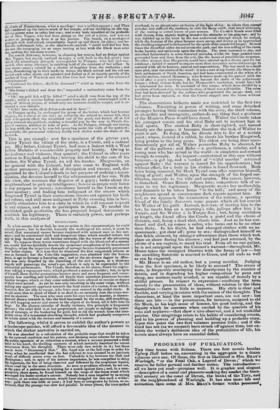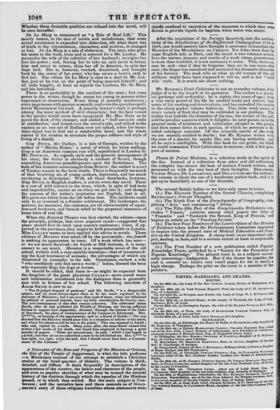PROGRESS OF PUBLICATION.
Tux time teems with fictions.. There are four novels besides Tylney Hall before us, amounting in the aggregate to a dozen volumes save one. Of these, the first in likelihood is Mrs. BRAY'S Warleigh, "or the Fatal Oak, a Legend of Devon ;" which we reserve for fuller perusal and further notice. The introduction— all we have yet read—promises well. It is graphic and elegant —descriptive of a social and pleasure-seeking day =titbit the beau- tiful scenery on the coast of Devon, the banks of the Tavy, and ihi the neighbourhood of Warleigh. It has also more life and animatima than so. SA Nisi itgAICS fOrERRK wos Pluesseds Whether these desirable qualities are infused into the novel, will be seen hereafter.
De La Macy is announced as "a Tale of Real Life." This mostly means, in the case of novels and melodramas, that some actual occurrence is expanded into distortion, till what there was of truth in the circumstance, characters, and motives, is changed or lost. De La Macy is a tale of abduction. The hero, who gives his name to the work, loves and is rejected for a Mr. Linden. He persuades the wife of the infidelity of her husband; inveigles her Into his power ; and, forcing her to take an oath never to betray him and never to return, ships her off to America, to spite her liege lord. She is, however, tracked, discovered, and brought back by the suitor of her sister, who has sworn a lover's oath to find her. The villain De La Macy is shot in a duel by Mr. Lin- den, just as he was on the point of being married himself; and all ends happily, at least as regards the Lindens, Mr. St. More, and his betrothed.
There is no probability in the conduct of the story ; but some power in the writer, though he seems too young to possess either experience or observation. Every thing is grandly mysterious ; every page teems with passion or mouth; and even the quondam quill- driver Ifyronizes at his work. A rascally lawyer's clerk is perhaps among the most marked of civil characters ; but the best versed in the species would never have recognized Mr. Mac Guia as he paced the deck of the steamer, and smiled a " half-sarcastic smile of satisfaction," and leaned over the vessel's side, and talked to the captain as no one out of Bedlam ever yet talked, when his imme- diate object was to find out a comfortable hotel, and the whole extent of his mission to ascertain the proper address and style of living of a family.
Guy Rivers, the Outlaw, is a tale of Georgia, written by the author of " Martin Haber," a novel of which we know nothing. Guy is an American romance run wild, republished in London by Mr. NEWMAN. As regards style and the general management of his story, the writer is obviously a student of Scorn, though engrafting American grandiloquence upon the Scotchman. The tone of his romance seerns caught from Beams: the outlaw is a sort of Yankee corsair in the back-woods. There is frequently too much of that besetting sin of young authors, digression, and too much overlaying in description. With all these drawbacks, however, Guy Rivers, to English readers, is not an every-day novel. There is a sort of wild interest in the story, which, in spite of bad taste and improbability, carries us on when we get into it ; and thoagh the sources of the writer's inspiration are English, that is all. His parts are taken from the life before him. The incidents could only hsve occurred in a frontier settlement. His landscapes, his persons, his manners, his costumes, are all characteristic of squat- ters and borderers, and furnish relief to the perpetual sameness of home tales of real life.
When the Rejected Theatre was first started, the editors—upon the principle, perhaps, that vires acquiret eundo—suggested that plays should first be tried upon country audiences; • when, if ap- proved in the provinces, they might be held presentable in London. Miss CuLLEN seems to have applied this advice to novels. Three editions of Mornton were taken off by the provincials : the fourth is making its appearance in town. Of a work which has seen— or we are much deceived—its fourth or fifth lustrum, it is unne- cessary to say much. Mornton is a respectable novel of the old school, written with a very amiable intention—that of recommend- ing the kind treatment of animals; the advantages of which are illustrated by examples in the tale. Gentlemen, eschew a wife "who needlessly sets foot upon a worm ;" ladies, discard the beau who wantonly flogs his dogs or horses.
It should be added, that there is—as might be expected from the daughter of the great physician CULLEN—wore sound sense and information introduced into the dialogues than is generally met with in fictions of her school. The following anecdote of ADAM SMITH is new to us.
" The ill-judged disposal of penkions " said Mr. Savile, "is a disagreeable subject, and we must always expect them to be too much regulated by the character of Ministets •' but I sin sorry that most of them, when not influenced by political or personal interest, have too little consideration for literary men. 'The evil consequences of this often remain unknown. The celebrated Adam Smith, after he bad published his Wealth of Nations, not having sufficient fortune to support him respectably, obtained, through the interest of the Duke of Buccleuch, the place of Commissioner of the Customs in Edinburgh. Mrs. C•• • 'n, on hearing of the appointment, said to a friend of Smith—. She was shocked that the Ministry should place him in a situation so inferior to his merit, and where his talents would be lost to the public.' This was repeated to Smith ; whoonly replied by a smile. Many years after, the same friend visitedhim within a few weeks of his death, and found him employed in burning a great number of papers. These are manuscripts,' he said, • which I had hoped to Olish ; but they are in too unfinished a state to be left behind me. Mrs. C• in VMS right, too right, when she said, that I should never have been a Commis- 'goner of the Customs."
A Narrative of the Rise and Progress of the Miss-ion at Orisssa, the Site of the Temple of Juggernaut, is what the title professes —a Missionary account of the attempt to establish a Christian station at the head-quarters of idolatry. The volume is thick, detailed, and diffuse. It deals frequently in descriptions of the appearances of the country, the habits and character of the people, and even in popular sketches of what may be termed the natural history of the districts through which the apostles of the Hindoos passed, or in which they settled. But the main subject is Con- version ; and the narrative here and there reminds us of GOLD- , Nunes story of those religious travellers whose statements were chiefly confined to narratives of' the resources to which they were driven to provide liquids for baptism when water was scarce.
After the inquisition of the Foreign Quarterly into the authen. ticity of the Recollections of the Eighteenth Century from 1710 to 1800, one would scarcely have thought it necessary to translate the Memoirs of the Marchioness DE CREQUV. Yet it has been done by some English lady at Paris, and the result is two volumes octavo. Into the matter, manner, and merits of a work whose genuineness is more than doubtful, it is not necessary to enter. This, however, may be said—that if they be forgeries they are in one sense able ones ; the forger has conceived and sustained the dramatic character of his heroine. The work tells us what an old woman of the aid noblesse might have been supposed to tell us, and in her " auld wife" style. It is much ado about nothing.
Mr. ROGERS'S Fruit Cultivator is not an everyday volume, if we judge of it by the length of its gestation. The author is a practi- cal gardener and orchardist: he is eighty-two years of age; from a very early period of his life he studied books and nature, took notes of' his reading and observations, and has embodied the results in the cheap pocket volume before us. This little work treats of every variety of fruit that may be cultivated in our gardens. The author first unfolds the character of the tree, the nature of the soil, and the peculiar aspect in which it delights: he next passes on to the general mode of treatment and cultivation adapted to the genus, and then comes down to each species, of which he presents a de- tailed catalogue raisonne. Of the scientific merits of the work we are scarcely entitled to decide ; but Mr. ROGERS writes with the ease of a master, he speaks like one having authority, amid all he says is intelligible. With this book for our guide, we think we could commence Fruit Cultivation to-morrow, with a fair pros- pect of success.
Fleurs de Poisie Moderne, is a selection made in the spirit of the day. Instead of a collection from other and old collections, the compiler has chosen the best of modem French writers, and presented us with the very best of their thoughts. BERANGER, VICTOR HUGO, DE L AMA RT I NE, and DEL AV IGNE are the authors: the volume is about the size of a handsome pocket-book, and it is got up as beautifully as one of the Annuals.
The several Serials before us we have only space to name.
(1.) The Eleventh Number of the Sacred Classics, completing BEVERIDGE'S Private Thoughts. (2.) The Ninth Part of the Encyclopadia of Geography, com- pleting "Asia" and commencing "Africa." (3.) The Fifty-fifth Part of the Encyclopedia Britannica con- cludes " France," contains among other papers the lives of " Franklin " and "Frederick the Second, King of Prussia," and begins an article on the "Funding System." ' (4.) The first Four Numbers of the Lancet edition of the Minutes of Evidence taken before the Parliamentary Committee appointed to inquire into the present state of Medical Education and Prac- tice in the United Kingdom. A cheap work on an important sub- ject, dealing in facts, and to a certain extent at least in responsible opinions. (5.) The First Number of a new publication called Popular Knowledge Tracts, published by a "Society for the Promotion of Popular Knowledge." The present tract is on a subject univer- sally interesting—Indigestion. But if the theme be popular. the cost is scarcely so: twelve very small pages for 3d. is surely a high charge. Perhaps the price on the cover is a mistake of the printer's.



























 Previous page
Previous page